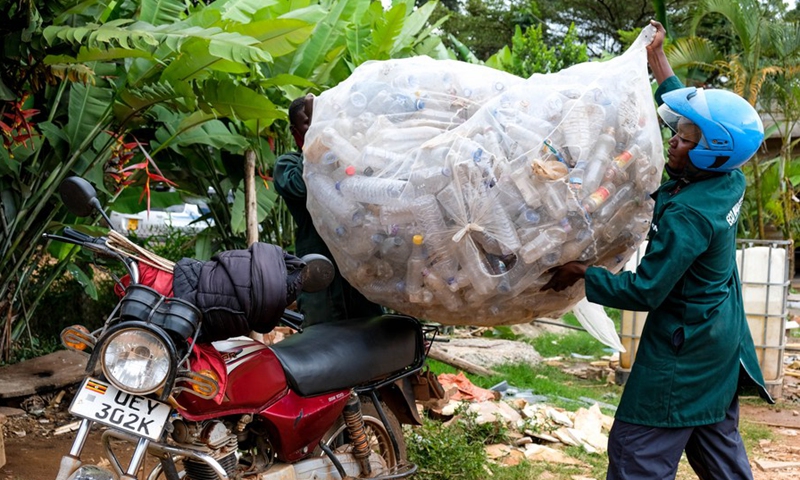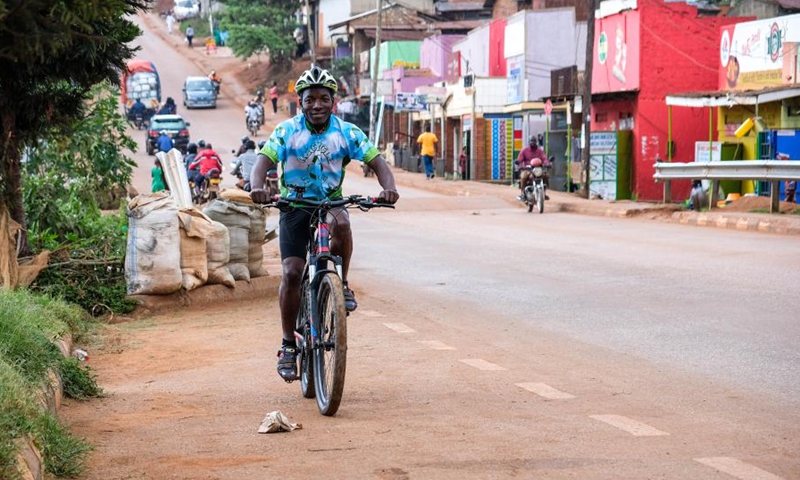
Workers of Eco Ways Uganda place a sack of reusable plastic bottles on a motor bike in Kampala, Uganda, April 16, 2021.(Photo: Xinhua)

Gerald Ndashimye, the founder of Eco Ways Uganda, rides his sport bicycle in Kampala, Uganda, April 16, 2021.(Photo: Xinhua)
Gerald Ndashimye, 32, has been cycling since childhood. He is now a professional cyclist.
According to him, cycling in the countryside is the most rewarding because of the fresh air and the green environment.
This greenery is however threatened by the poor plastic waste management in the country, Ndashimye told Xinhua in a recent interview.
Activists say only 9 percent of all plastics ever created has been recycled, meaning that the plastic waste menace is growing by the day.
This plastic waste is chocking drainages leading to floods especially in the capital Kampala. This scales up malaria cases as a result of the stagnant water which provides a breeding ground for malaria-spreading mosquitoes.
Uganda has previously banned the use of single-use plastics but enforcement measures have not been effected.
During the commemoration of Earth Hour last month, environmental activists launched a campaign calling for a total ban on single-use plastics.
"Plastic waste is choking our country - polluting the air, water, and soil that both people and wildlife need to survive," the activists, including government departments, civil society, social formations and the World Wide Fund for Nature said in a press statement.
This has forced environment protection campaigners like Ndashimye to not only create awareness about proper plastic waste disposal but to also engage in the actual cleanup.
Five years back, Ndashimye started picking up plastic waste in his community. He encouraged his other colleagues to do the same so that the environment can be protected and it also protects them.
His colleagues he graduated with at university were disappointed in him for choosing to collect plastic waste instead of following his career.
Ndashimye said he does not regret the move he took, noting that step by step, with increased awareness, the environment will be protected especially against plastic waste.
Using his meager resources from cycling and painting, Ndashimye bought plastic waste recycling machines.
He set up his small recycling plant in a slum area in Nsambya, a suburb in the capital Kampala.
"I got a place near a carpentry workshop next to a drainage channel where I built a make-shift store. I was looking at clearing my surroundings," Ndashimye said.
Over the years, he has created a team of over 70 people who are involved in the collecting of the waste, cleaning up the waste and recycling.
Ndashimye has also set up collection centers in different suburbs of the capital and in the western part of the country.
He now manufactures plastic construction materials like roof tiles, floor pavers, outdoor chairs and fencing poles.
Mary Kyatuheire is one of Ndashimye's clients. Kyatuheire told Xinhua that she prefers the plastic poles for fencing because they cannot be eaten up by termites.
Ndashimye said every day they recycle plastic waste worth one tonne, meaning that the environment is saved from the effects of a tonne of plastic waste.
The neighborhood where Ndashimye's business is located has started appreciating its relevance. Some of the residents now collect plastic waste from their community and sell it to Ndashimye.
Some are even employed at the recycling plant where they earn a daily income to improve their livelihood.
"I have fallen in love with cleaning the environment. Back home, I encourage my neighbors to throw the plastic waste in one place so that I can pick it up and bring it to Ndashimye," said Amina Natabi, one of Ndashimye's employees.
"From my work I earn enough money to take care of my children and even save some at savings and credit group," Natabi added.
Ndashimye said at times he does outreaches where he goes into the communities and sensitizes them about proper plastic waste management.
He argued that although his business deals in plastic waste recycling, plastic should entirely be banned because in the long run, if its waste disposal is not properly managed, it will have dire consequences to the environment.





